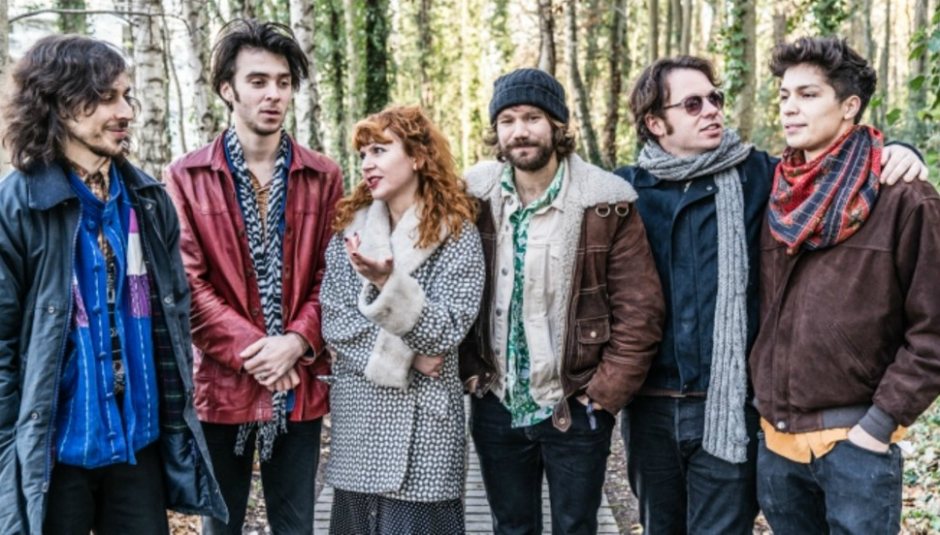Tucked away under an unassuming arch near the entrance to Amsterdam’s Vondelpark, Vondelbunker is not your average rehearsal space. A former bomb shelter, it became the centre of the city’s punk scene in the late 1970s, and ever since has drawn radicals, DIY artists, and the independent of mind to its low-ceilinged, bare brick interior – a sign at the door declares it to be “a non-commercial cultural centre run by volunteers out of the conviction that space is political.”
A deep groove emanating from one of the cluttered rooms guides me to Altın Gün, playfully running through some tracks for their forthcoming second album. They’re due to start recording in the New Year; for now, the band is just trying out ideas and experimenting, whittling down twenty or so tracks to the ten they’ll actually record. The songs themselves are not their own – as with their debut record, On, they repurpose Turkish folk standards and classics, injecting them with a healthy dose of funk and psychedelia. The result is an infectious, energetic mix that’s the very definition of “feel good” – songs imbued with joy and a sense of community re-interpreted for a new generation of music fans.
The seven-piece – Ben Rider (guitar), Daniel Smienk (drums), Jesper Verhulst (bass), Merve Dasdemir (vocals), Erdinc Yildiz Ecevit (saz, keys, vocals), and Gino Groenveld (percussion) – have spent the year crisscrossing the globe, bringing their positively dirrty grooves and wah-wah fuzz to sunny festival fields and dark, sweaty clubs alike. Live, they’re a lithe, slinky beast, unifying crowds in a sea of dancing limbs and carefree glee. In cynical times like these, it’s refreshing to see a band play for the sheer love of the music and spreading cultural richness as far as they can.
DiS: How did you form, and how did the idea for the band take shape?
Ben Rider: Well, Jasper and I and our first drummer were in a band before this, and it was Jasper’s idea to form this band with the three of us. Then we found the Turkish members on Facebook. Gino [Groeneveld] is a common friend from another band.
Jasper Verhulst: I knew Nic [Mauskovic, original drummer] from before. From jam sessions.
BR: It was sort of instant; we got together very fast. It was the first time I had ever had a band formed through Facebook as well; usually, it’s just that you know people.
The songs on the album are all covers, they’re Turkish folk standards. How do you go about choosing the songs that you wanted to do?
JV: It’s mostly me and Erdinc [Ecevit Yildiz] who knew the Turkish songs. You just hear something and think, well, this could be a good one for the band. We’ll try it or Erdinc will suggest something, and sometimes it works, and sometimes it doesn’t. We really want to try and make it our own and not copy the already existing version of it. So sometimes it’s hard, sometimes it easy; we usually pick the easy ones.
Was it all just about the songs or were there a few legendary Turkish artists where you said: “OK, we’ve got to do one song by this person”?
BR: It’s mainly song based. For me, it’s the sound and the feeling you get. They’re not specifically from an artist, although on our last album, there is one artist that we’ve got quite a few songs of. I guess that’s one guy that we commonly use.
JV: I think about sixty per cent of our songs are written by him.
BR Really?
JV: Yeah. Neşet Ertaş. He’s like an idol for Erdinc; he’s also from the same region, that’s where his parents are from, and he is just a really good songwriter and amazing saz player. So we ended up doing a lot of his songs.
Was it always the idea not to just do faithful renditions, but to change them and put a lot of your personality into them as well?
JV: Well, at first we did a lot of actual covers, so we just copied already existing versions of those standards.
Gino Groeneveld: Mostly to get acquainted with playing the style. As soon as we wanted to make an album, we rearranged it.
JV: We didn’t want to record any songs that we didn’t arrange ourselves, because if you just copy someone else’s arrangements then it’s kind of weird; you really are a cover band. We wanted to be more like a folk band, playing standards and traditional music but really making them our own. Like with Miles Davis playing ‘Summertime’ or something; he would play completely his own version.
There are thousands of versions of ‘Summertime’, but I wouldn’t call them covers, it’s more like the song belong to everyone. It’s kind of the same with those songs we play in Turkey. Those songs are regarded as classic standards and folk traditions.
BR: But I think when it comes down to the way we play things, the first songs that we properly covered were in a style that we liked, a certain 70s, funky, groovy stuff. I do think that that style does come naturally to us because we were in a band before this, in that kind of region as well. So, whatever we do, we make it that style which is, I guess, the Altın Gün style, really.
Do you see what you do as giving new life to some long-lost music? Spreading the word about a genre that maybe a lot of music fans aren’t particularly knowledgeable of, or aware of?
JV: I don’t think it was really our intention to do that, but that’s kind of what happens.
BR: Which is cool.
JV: Yeah, that’s nice. A lot of people have listened to our music, and they’ve never listened to Turkish music before, you know?
GG: But also, in a particular DJ scene, a lot of record diggers will go looking for Turkish compilations. Before we started this band, some friends of mine were suddenly getting these records from all over the place, then also having these Turkish records or compilations from the 70s, so there was already this thing about people checking out music from all around the world from that era. There isn’t a band like ours at the moment, especially in Turkey – there’s no band in Turkey that does these old songs in such a way anymore, so that’s why there’s a big popularity right now for us. There is a big market for us there.
Turkey has had a fairly negative reputation recently, and a rough ride in the international press with all the political turmoil and that kind of thing. Do you see what you do as a way of fighting back against that?
BR: No, not at all. We have nothing to do with that. I mean, we’ve all seen what happens on the TV and stuff, but whenever I go there, I have a great time; so many nice people there, and I didn’t really know anything about this music until I joined this band, actually. I don’t think we see it anywhere close to being political or having an opinion that way, at all. Erdinc has been affected personally by it, but we still don’t let that impact us.
JV: It’s a good way to bring some positive Turkish vibes to the world, at a moment when there are a lot of negative Turkish vibes. That’s not political; it’s just…when I thought of this project, that was one of the things that went through my mind. I live in a neighbourhood in Amsterdam where there are a lot of Turkish people, and I really like this music, so I thought it would be good to do something with that love for this culture and the music. So I’m glad it turned out this way.
Multiculturalism is also under threat all across Europe, with politicians claiming it’s a failed project. Do you see yourselves as having a role in pushing back against that and preaching a more inclusive idea of unity? Like you said, it’s never the people; it’s always the power structures – people, wherever you go, are always usually very nice.
GG: I think music in general, just to make music, is already a uniting thing for a lot of people. It’s not that we necessarily want to play music to connect these different cultures; it’s more that we are raised in a way where we are influenced by a lot of things. But it’s not like we actively want to politically get involved in such a way; it’s more of an organic thing.
BR: Again, it’s not intentional at all, but I did realise after some shows that there were big groups of Turkish people coming along and big groups of younger Dutch kids or whatever; not Turkish people. And they would be dancing and having a good time together, and they would not normally mingle as much. I realised that that was quite nice actually. Even though it’s not intentional, there is some kind of unity thing going on that wouldn’t happen otherwise and I feel quite good about that – getting groups of people together that wouldn’t usually hang out.
You played Le Guess Who? last year, and then Eurosonic this January, then you were booked to play a whole host of festivals this summer. And you’ve just done a big, headline tour. How was the reaction to playing all across the continent?
BR: Very good. We went to Canada, and the reaction was ridiculously good there – I didn’t expect that at all. France was really good, but that’s French people…they’re generally a little more interested in international music than other countries.
JV: They are more educated.
BR: I don’t know why, but even my parents said: “Yeah, they’re always interested in international shows. More so than other countries.” Not every country is as easy.
JV: Germany was a bit tougher.
GG: Yes! They only listen to DJ’s [laughs].
BR: Then again, if you go to the right places…we had a really good show in Berlin that was sold out. Fusion Festival also was a really good reaction. But other towns in Germany, it was just a bit…meh, you know? I guess it takes time, and maybe there is just a lack of interest.
Do you think the ETEP program really helped you in terms of finding a bigger audience and getting your music out there to more people than would have happened organically or naturally?
JV: Well, I guess it got us more shows, yes it did. I wasn’t really aware of that happening though; I heard something about that.
BR: I think Ronald [the band’s manager] would probably know more about the actual results of that.
JV: We just show up for shows we are booked for; that’s basically it.
Two years ago Selda played at Le Guess Who? – she was invited by St. Vincent, who said that she had been a big influence on her – and it seems like there’s a renewed interest in the Turkish music scene from the 70s and that traditional folk heritage. Do you feel that too? That people are discovering it and are excited about it for the first time?
BR: Sure, because Selda was one of those artists who had been played in bars in Amsterdam and stuff, I didn’t know about that. It was a kind of little mini hit here.
JV: I started with her, actually. For me, I discovered Turkish music through Selda because Finders Keepers, the English label, re-issued her first album and that became a kind of cult hit. So I think for a lot of people that was the introduction to Turkish psychedelic music.
But it’s happening in a lot of countries right now. All these re-issue labels and compilations. Also YouTube and Spotify make it really accessible for young people; music that was not accessible twenty years ago is all of a sudden accessible for everyone, and that’s a big game changer.
BR: I guess that’s why Selda’s touring again because there was some kind of revival. People started to get to know it again, and we were part of that too.
A lot of this stuff isn’t in print anymore, and it was never easy to find unless you went to some obscure record store, somewhere in Istanbul, and you were digging and you knew what you were looking for. Now, it’s all on the Internet, you can spend a couple of hours clicking away, going on deep dives in whatever genre or style.
BR: Yeah, exactly. I think it does depend though; some people are more interested in digging, listening to playlists, and discovering brand new stuff. The Internet definitely helps with that. But some people need to be spoon-fed, they aren’t the listening types, and they’re not involved in that at all. I guess things like radio does help still.
Like with YouTube videos – I feel certain things we have done have made a big difference. We did a video for this radio station called KEXP, and that seemed to get us a lot of gigs as well.
Well, being on KEXP is almost like a seal of approval now. For bands, once you’ve done one of those sessions, it’s like: “Ah, ok. We should pay attention to who these guys are.” Same with the Tiny Desk Concert series.
BR: Yeah, we’ve watched a lot of those. They’re great.
Ultimately, what do you think people can take from Turkish folk music? What’s the message that we should all heed?
BR: I think it’s about getting together and dancing and singing. Although the songs are sometimes quite sad – the lyrics I mean.
Merve Dasdemir: Yeah, but there is always a silver lining.
BR: They can also be romantic and poetic. But at the same time, the way you sing things or singers…it’s got this energy and power to it, you know? That’s kind of…bittersweet, I guess. But then people enjoy it, even if it is about someone dying or something. It’s just very powerful.
On is out now via Bonjo Joe Records. For more information about Altın Gün, including forthcoming tour dates, please click here.






















